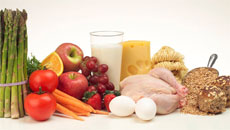South Asians in North America, have premature heart attacks under age 65 at a rate double the national average. Many South Asians suffer from high blood pressure. Some suffer heart disease as a result of diabetes. Others develop an arrhythmia, murmur, or irregular heartbeat.
Increasingly, women are becoming the greater percentage of heart disease sufferers. Many studies have noted that the leading causes of prevalence within South Asians may be attributed to genetics and a sedentary lifestyle. It is important to be informed and make the necessary changes to decrease the onset of heart health problems. So with that being said, we have compiled a list of 28 tips (one for each day of February) that will help you maintain a healthy heart or possibly even prevent heart disease.
February 1 Take the stairs instead of an elevator or escalator at school or the mall. Just start with one flight. Soon, you’ll be ready for two.
February 2 Knit a scarf. Put your hands to work and your mind will unwind. Engaging in activities like knitting, sewing, and crocheting helps relieve stress that does the ole ticker a world of good. For the “uncrafty” lot who don’t do needles, a jigsaw puzzle works great too.
February 3 Park your car at the far end of the parking lot. The short walk to and from the store or school helps your heart.
February 4 Take the scenic route home. Put down your cell phone, forget about the driver who cut you off, and enjoy the ride. Eliminating stress while driving will help lower your blood pressure, which your cardiovascular system will appreciate.
February 5 Make time for breakfast. This is the one meal you shouldn’t skip. The good-for-you benefits of eating a healthy breakfast are numerous. What is included in a healthy breakfast? Whole grains (whole grain rolls, cereals, etc.), low-fat protein (i.e. hard-boiled egg, turkey bacon), low-fat dairy (skim milk, low-fat yogurt or cheese), and fruits and vegetables.
February 6 Let the music move you. Whether it’s a rumba beat or a two-step tune that gets your body moving, dancing raises your heart rate, burns some calories (between 150-300 calories an hour), and makes for a great heart healthy workout.
February 7 If you ride a bus or sky train, get off a stop before your destination. Walk the rest of the way.
February 8 Eat chocolate. No guilt required. Rich, dark chocolate tastes delicious, and according to a study, it can help stave off heart disease because of the flavonoids it contains. Other research also suggests that chocolate can positively affect blood clotting.
February 9 I’ll drink to that. Red wine and dark beer contains more protective antioxidants or flavonoids than other alcoholic beverages. You can get maximum heart protection with up to 1 ounce of alcohol daily, the equivalent of two, 4 ounce glasses of wine, a 12 ounce bottle of beer, or 2 shots of spirits.
February 10 If you have a dog, think of the dog as an exercise machine with fur. A brisk walk with the dog is good for both of your hearts. Make it a part of your daily routine.
February 11 Go fish. Studies have shown that including fish with omega-3 fatty acids (i.e. salmon, herring, sardines, and to a lesser extent tuna) into your diet can reduce the risk of dying from heart disease by a third or more.
February 12 Stretch it out. Practicing yoga not only makes you more limber and helps you relax (which combats stress), but according to recent research from India, it also positively affects the heart rate variability (HRV) that is an indicator for heart health.
February 13 Go nuts. Almonds, walnuts, pecans, and other tree nuts deliver a powerful punch for lowering your risk of cardiovascular and coronary heart disease. Studies show that substituting saturated fats with fat from nuts actually helps reduce bad (LDL) cholesterol.
February 14 Colour is everything. The more colourful the vegetable, the more heart-protective antioxidants contained within. Steaming is better than using the microwave for preserving nutrients. However, over-steaming or boiling will remove many of these heart healthy elements.
February 15 Focus on the middle. Your middle, that is. You don’t have to be super thin to reap the benefits of a smaller waistline, but carrying too much weight around the middle raises blood pressure, affects blood lipids (and not in a good way), and does other damage to the heart. Abdominal exercises are good, but remember it’s calories in (what you eat), calories out (how you exercise) that will make a difference in the tape measure.
February 16 Know your numbers. Keeping your blood pressure, blood sugar, cholesterol, and triglycerides in check are important for good heart health. Learn the optimal levels, and don’t skip your regular physical exams.
February 17 Laugh. Whether you like watching Russell Peters or an Indian comedy, whatever gets you chuckling is good for your heart. Research shows that laughter helps relieve the stress that damages the endothelium (the tissue that forms the inner lining of blood vessels and helps the blood flow) and promotes the healthy function of blood vessels.
February 18 Shun the salt. Studies have concluded that salt is one of the leading culprits fuelling the rise in heart disease. Most of our high salt intake comes from processed food and restaurant-prepared food. Think twice before filling up on your favourite fast-food fix.
February 19 Be a kid again. Fitness doesn’t have to be boring. Plan an evening out roller skating or bowling. Do both and you can burn, on average, around 600 calories.
February 20 Cut the fat. Slicing your fat intake to no more than 30% of your daily calories will help cut your risk for heart disease. If you’re not into reading labels or counting calories, think twice before you savour your next meal. Do a mental calculation of what you are eating.
February 21 Sip Tea. Different studies (some focusing on black tea, others on green tea) show that drinking tea can improve arterial health.
February 22 Good dental hygiene does more than keep your pearly whites glistening. It may affect your overall health. Research suggests that several types of cardiovascular disease, including coronary artery disease, may be connected to your oral health.
February 23 Next time you feel overwhelmed, get mad, or are totally exasperated, take a stroll. A five-minute walk will do wonders for clearing your head and lowering your stress levels.
February 24 Pump some iron. Aerobic activities may be the star players in fitness for a healthy heart, but strength training needs to be part of the team. Its effect on weight control is awesome-more muscle mass means burning more calories. The American Heart Association gives strength training a thumbs-up for lowering the risk of heart disease.
February 25 Find your happy place. A sunny outlook is good for your heart. Research shows that those who are happy tend to have lower levels of the potentially harmful hormone cortisol and other stress-inducing chemicals.
February 26 Touch and be touched. Many scientific studies have shown that people who were touched lovingly every day had significantly fewer heart problems than the control group.
February 27 Eat seaweeds. They have been shown to stabilize blood pressure, regulate levels of triglycerides, phospholipids and cholesterols, they dissolve fatty build-ups in the blood vessels, they can restore cardiac efficiency and prolong the life of the heart muscle, and they encourage a steady heartbeat.
February 28 Eat garlic. Study after study has confirmed garlic’s abilities to lower blood pressure, reduce phospholipids and cholesterol, strengthen heart action, increase immune response, reduce platelet clumping and clotting (thus reducing strokes) and stabilize blood sugar levels. Eat garlic raw or lightly cooked, several cloves a day






